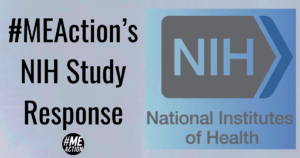
People with myalgic encephalomyelitis/chronic fatigue syndrome (ME/CFS) have been concerned since the start of the coronavirus pandemic that a subset of COVID-19 patients will go on to develop ME/CFS. Unfortunately, we are already hearing from many COVID-19 survivors around the world that they are continuing to experience debilitating symptoms for many months, even after “mild” cases. On just one COVID-19 tracking application, 300,000 people have reported long-term symptoms. Tens of thousands of these “long-haulers” are participating in Facebook and Slack groups to discuss symptoms they experience past the point when clinicians and public health officials have claimed they should be fully recovered. Long-term consequences of SARS-CoV-2 infection (the viral cause of COVID-19) are already a crisis.
Not everyone experiencing long-term consequences from SARS-CoV-2 (“sequelae”) will fit ME/CFS diagnostic criteria. Some symptoms will likely be due to blood vessel damage and/or specific organ damage caused by SARS-CoV-2; and patients who were hospitalized may have post-intensive care syndrome or post-acute respiratory distress syndrome. Other patients may develop autoimmune disorders triggered by the virus, such as Type I diabetes or Guillain-Barre syndrome. We need to ensure that researchers and clinicians do thorough workups and consider each of these potential issues in their differential diagnosis. But based on what’s been reported in the aftermath of other infections that triggered ME/CFS, we expect many long-haulers will fit ME/CFS criteria.
It is vital that researchers and clinicians who treat and study long-haulers understand ME/CFS diagnostic criteria and management advice. Common rehabilitation approaches, such as graded exercise therapy, can cause permanent damage in people with ME/CFS, and COVID-19 patients experiencing long-term symptoms have been urged to avoid graded exercise for this reason. These approaches are being recommended and used to treat patients with COVID-19 sequelae right now, without understanding of the harm they might cause.
#MEAction will continue to advocate by educating researchers, clinicians and the public to help them distinguish ME/CFS from other post-infectious diseases, and helping ensure that everyone experiencing long-term symptoms from COVID-19 has access to the diagnostic and management advice they need.
Further reading:
The Atlantic: COVID-19 can last for several months
Washington Post: Researchers warn covid-19 could cause debilitating long-term illness in some patients







2 thoughts on “Post-COVID research & clinical care must include ME/CFS”
I’ve had ME/CFS for 23 years, with the past 6 years leaving me housebound and recliner/bedbound. My husband and I both caught COVID-19 back in March. Because the test for it was unavailable, our doctor dx us with “probable COVID-19”. My husband has recovered (as of 6/27/2020), but I still have not gotten over it. It definitely made my ME/CFS much more intensified. My senses of taste and smell have mostly recovered, but they even fluctuate at times. My eyesight was effected for some reason and has not improved. I haven’t read anything effecting eyesight, but it definitely has with me. My PEM, POTS, asthma and IBS is worse than pre-COVID levels. My arms and legs are like damp dishrags ……so much weaker and difficult to use. Everyone who already has ME/CFS…..please TAKE EXTRA PRECAUTIONS to not get COVID-19! My hubby and I were so careful, but we still got it.
I am concerned that researchers will not assess PEM/PENE in a meaningful way, if at all.
They won’t find it if they don’t look for it.
And patients won’t report if they don’t understand it. With delayed onset of PEM/PENE, most of them will simply be confused by “random” worsening of symptoms.
Researchers in the COVID-19 follow up studies need to be advised of the recent DePaul PEM questionnaire. https://www.ncbi.nlm.nih.gov/pmc/articles/PMC6468435/
Patients in social media groups might benefit from education about PEM/PENE.
Comments are closed.